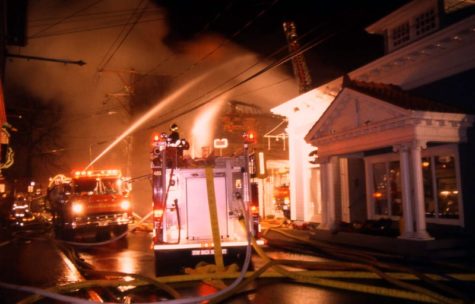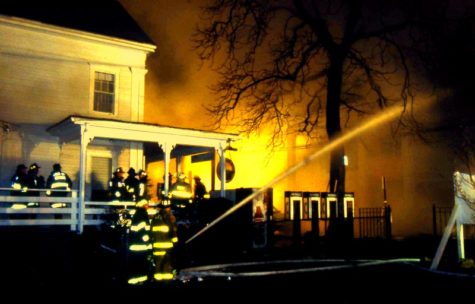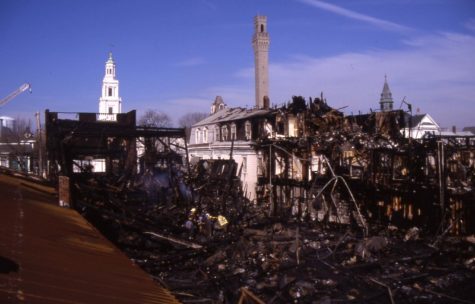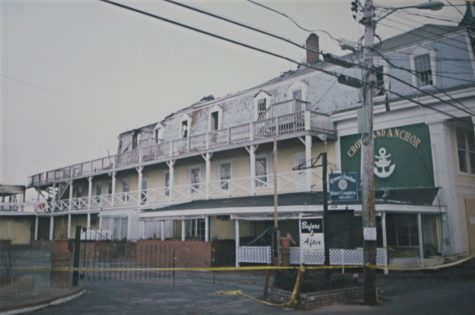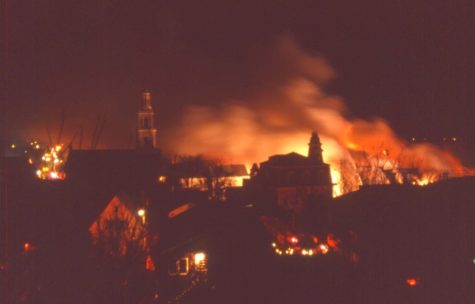
One of the first photos taken from a hill on Bradford Street overlooking the fire. The spire of the Universalist Church (located directly across from the Wharf). Photo: CapeCodFD.com
Memories can be a funny thing. Sometimes they are as hazy as smoke and other times they are burned into your mind like hot embers. Just ask anyone who was in Provincetown on the night of February 10, 1998. It’s been two decades since one of the worst fires in the history of the tiny village at the tip of Cape Cod. At the same time, it could have been a lot worse.
I had the chance to chat with several people who were involved with the efforts to control the fire, as well as those who were simply spectators who watched in awe as a fire caused by a space heater became a raging inferno. Dozens upon dozens, maybe even hundreds of firefighters came from as far away as Duxbury to try to save the jewel of the Cape.
Some of the firefighters I spoke with remembered it being cold while others recall it being a calm and mild night for February. All agree that it was fortunate timing that there was little, if any, wind that night and nearly no snow on the ground to hamper rescue efforts.
I recall leaving work in Orleans that night. Driving west down Route 6A, you could see the smoke from across the marshes. Some say you could see the glow of the embers inside the smoke across Cape Cod Bay from Plymouth! Emergency vehicles were in a constant parade heading towards the fire. Rick Weeks remembers his little daughter counting fire trucks as they whizzed by their house in Eastham.
The first alarm sounded at 6:45p.m. The second at 6:54 p.m. The third at 6:57 a.m. The fourth alarm was called at 7:04p.m., followed by the fifth alarm at 7:30 p.m.
Coming over the hill on Route 6 in Truro, none of the firefighters were ready for what they saw. It looked like someone opened up the door to Hell and the devil, himself, was throwing a party on Commercial Street.
This was the description I heard over and over again. And, if the devil was throwing a party, our firefighters and first responders were going to send him home as quickly as possible.
Of course, getting into Provincetown on any day can be a challenge on those narrow streets; imagine trying to maneuver ladder trucks and fire hoses! When faced with this level of emergency, you do whatever it takes to get your truck from point A to point B, even if it means lifting cars BY HAND and moving them out of your way (and they did), then parking your own truck blocks away, loading your equipment on your back and hoofing it several blocks to get to the heart of the fire.
The fire raged well into the night. Somehow, the majority of the damage was contained to the Whaler’s Wharf and neighboring Crown and Anchor.
That said, there were several close calls, including this story from Retired Lt. Robb Christensen from the Yarmouth Fire Department:
My crew I was assigned to was operating on Commercial Street from the front yard of the Unitarian Church, flowing hundreds of gallons of water into the Whaler’s Wharf Museum. Harwich Fire Chief Robert Peterson was the chief in charge on Commercial Street. After conferring with other chiefs and officers, a decision was made to make an interior attack on the Crown and Anchor Hotel to stop the hotel burning all the way to Commercial Street. A crew of four from Yarmouth FD, including myself, was assigned by Chief Peterson to go inside, up to the third floor, and assist and relieve some of the Harwich, Dennis and Brewster fire crews.
It took us five minutes to find the front door due to the heavy smoke. We finally found the door and followed the hose lines up the interior stairs and made it the third floor. As we were crawling down the hallway to find the other crews, all of a sudden Captain Rome from the Brewster Fire Dept. appeared from the thick smoke saying “Back the $&@# out! The building is collapsing!”
Just as he got to us, I remember looking up and seeing the moon and saying that’s not good. Then the wall of fire came down the hallway. We made it out safely, but the Harwich Crew hadn’t made it out right away. We turned around, started to enter the first floor, just when Harwich Crew appeared and made it out safely.
Water was of great concern. With a fire this size, it was entirely possible they would run out of water before the fire was extinguished. In fact, crews were pumping so much water into the Crown and Anchor that, at one point, it was knee deep on the upper floors. With a fear of collapse, somehow crews needed to figure out a way to drain the water from the upper floors.
Harwich Fire Chief Norm Clarke recalled a firefighter knocking toilets off their pedestals in order to let water drain down the pipes.
The fire was so destructive and so fast, Chief Clarke recalled trying to “clear” floors by knocking down doors to rooms along one hallway. Door after door was kicked open with nothing behind it but the view of the surrounding buildings and a steep drop to the ground.
Later on in the night, Pete Rubel (who was in his late teens at the time of the fire) was clearing rooms one at a time in the lower level of the Crown and Anchor when he and another firefighter LITERALLY stumbled into the charred liquor vault of the night club. He remembers lumbering out to the street in search of a police officer who could stand guard over the remaining alcohol.
Fire departments were leap-frogging from station to station across the Cape well into the early hours of the following day. “It was dinner time when the first alarm sounded,” recalled now-Harwich Deputy Fire Chief David LeBlanc, who was working dispatch the night of the fire. “One station would order dinner and then get called up for coverage, so the next department to come in to cover would get to eat their dinner.”
Some who didn’t have the chance to eat in one of the fire stations along the way were treated to the thoughtful hospitality of Provincetown locals – from the schools’ buses which were moved into place to offer a place to sit with running heaters, to restaurants like Fat Jack’s Café, who simply opened their doors and their kitchens to feed the tired and hungry firefighters.
Another firefighter recalled late in the night when someone walked out through the smoke and ash with a tray filled with coffee and sandwiches. The coffee was served in cups with saucers and the sandwiches were carefully cut in triangles with the crusts taken off.
That’s why we all love Provincetown so much. Because, even in the face of disaster, there is a charm you will not find anywhere else in the Northeast.
As I spent more time with various firefighters and witnesses to the fire, it became clear to me that many of these people have not been able to connect since the night of the fire. Firefighters were scrambled and matched with firefighters from towns across the region. Many of these firefighters had never met, much less been matched together in what could have been a life or death situation. Again and again, despite the chaos, the firefighters I spoke with agreed: They all worked together like a team – no questions, no hesitation and no injuries (as a direct result of the fires).
One life was lost following the fire when the caretaker for Whalers Wharf took his own life several days later. Had the fire taken place in the summer season, had there been snow or high winds, there is no doubt that there would have been more destruction, injuries and possible casualties.
Perhaps someday, there could be a gathering for the men and women who pulled together that night. From the firefighters, EMTs and police officers, to the residents and business owners to the folks who just happened to be visiting Provincetown on what should have been a quiet “off-season” night.
For more amazing stories and photographs, please visit: http://www.capecodfd.com/PAGES%20Special/PTWharf1.htm
Special thank you to Lt. Britt Crosby (retired) from COMM Fire, Harwich Fire Chief Norm Clarke, Dept. Fire Chief Dave LeBlanc, Pete Rubel from Brewster Fire, Harwich Fire Dept Paramedic Justin White, and Retired Lt. Robb Christensen from the Yarmouth Fire Department.
And an extra special thank you to ALL the men and women who pulled together on the night of February 10, 1998. Because of your bravery, we still have our beloved gem at the end of the Cape.
Do you have a story from the night of the Provincetown fire? Please email me: [email protected]




